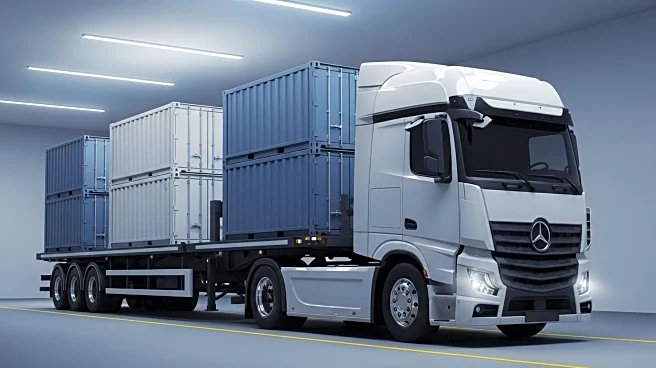What is the story about?
What's Happening?
C.H. Robinson has introduced a new cross-border freight consolidation service aimed at reducing costs for shippers moving goods from Mexico to the United States. This service is designed to save shippers up to 40% by consolidating less-than-truckload (LTL) freight at a secure facility in Mexico, allowing it to move more efficiently across the border. The service addresses inefficiencies caused by Mexican laws requiring all freight on a truck to be cleared by the same customs broker, which previously inhibited consolidation. By utilizing artificial intelligence, C.H. Robinson's Optimizer technology determines the best way to route freight to its final destinations, providing earlier inbound visibility and significant cost savings.
Why It's Important?
The introduction of this service is significant as it offers relief to supply chains strained by new and higher tariffs. By moving freight in bond, the service can defer U.S. tariffs for better cash flow or eliminate tariffs if the freight is passing through to Canada. This is particularly beneficial for automotive supply chains subject to high tariffs on items containing aluminum or steel. Additionally, industries such as retail, healthcare, and industrial manufacturing that rely on imports from Mexico stand to benefit from reduced costs and improved efficiency in their supply chains.
What's Next?
C.H. Robinson's new service is expected to attract more businesses looking to optimize their supply chains amidst economic pressures. As the service gains traction, it may lead to increased adoption of AI-driven logistics solutions across various industries. Companies may begin to reevaluate their supply chain strategies to incorporate such innovative solutions, potentially leading to broader changes in cross-border logistics practices.
Beyond the Headlines
The service not only offers economic benefits but also highlights the growing importance of technology in logistics. By leveraging AI, C.H. Robinson is setting a precedent for how technology can be used to overcome regulatory and logistical challenges in international trade. This could lead to further advancements in AI applications within the logistics industry, promoting more sustainable and efficient supply chain practices.
















